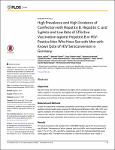High Prevalence and High Incidence of Coinfection with Hepatitis B, Hepatitis C, and Syphilis and Low Rate of Effective Vaccination against Hepatitis B in HIV-Positive Men Who Have Sex with Men with Known Date of HIV Seroconversion in Germany
Jansen, Klaus
Thamm, Michael
Bock, Thomas
Scheufele, Ramona
Kücherer, Claudia
Muenstermann, Dieter
Hagedorn, Hans-Jochen
Jessen, Heiko
Dupke, Stephan
Hamouda, Osamah
Gunsenheimer-Bartmeyer, Barbara
Meixenberger, Karolin
Objectives: Men who have sex with men (MSM) are at higher risk for coinfection with hepatitis B virus (HBV), hepatitis C virus (HCV), and syphilis than the general population. HIV infection and these coinfections accelerate disease progression reciprocally. This study evaluated the prevalence and incidence of these coinfections in HIV1-positive MSM in Germany. Materials and Methods: As part of a nationwide, multicenter, prospective cohort study of HIV-infected MSM, plasma samples collected yearly were screened for HBsAg and antibodies to HBc, HBs, HCV, and syphilis. Samples with indications of active HBV or HCV infection were confirmed by polymerase chain reaction. Prevalence and incidence of each infection and incidence rates per study participant were calculated, and incidences over 4-year time intervals compared. Results: This study screened 5,445 samples from 1,843 MSM. Median age at HIV seroconversion was 33 years. Prevalences of active, cleared, and occult HBV, and of active/cleared HCV were 1.7%, 27.1%, 0.2%, and 8.2%, respectively, and 47.5% had been effectively vaccinated against HBV. Prevalence of antibodies to Treponema pallidum and of triple or quadruple sexually transmitted infections (STIs) were 39.6% and 18.9%, respectively. Prevalence of STI, cleared HBV, HBV vaccination, and history of syphilis differed significantly among age groups. Incidences of HBV, HCV, and syphilis were 2.51, 1.54, and 4.06 per 100 person-years, respectively. Incidences of HCV and syphilis increased over time. HCV incidence was significantly higher in MSM coinfected with syphilis and living in Berlin, and syphilis incidence was significantly higher for MSM living in Berlin. Discussion: Despite extensive HBV vaccination campaigns, fewer than 50% of screened MSM were effectively vaccinated, with a high proportion of HIV-positive MSM coinfected with HBV. High rates of STI coinfections in HIV-positive MSM and increasing incidences emphasize the need for better tailored campaigns for HBV vaccination and STI prevention.
Dateien zu dieser Publikation
Keine Lizenzangabe
Verwandte Publikationen
Anzeige der Publikationen mit ähnlichem Titel, Autor, Urheber und Thema.
-
2022-01-14ZeitschriftenartikelEpidemiologie der Virushepatitiden A bis E in Deutschland Dudareva, Sandra; Faber, Mirko; Zimmermann, Ruth; Bock, C.-Thomas; Offergeld, Ruth; Steffen, Gyde; Enkelmann, JuliaMit Virushepatitis A bis E werden verschiedene infektiöse Entzündungen des Leberparenchyms bezeichnet, die durch die Hepatitisviren A bis E (HAV, HBV, HCV, HDV und HEV) ausgelöst werden. Zwar ähneln sich die Krankheitsbilder, ...
-
2022-01-14ZeitschriftenartikelEpidemiologie der Virushepatitiden A bis E in Deutschland Dudareva, Sandra; Faber, Mirko; Zimmermann, Ruth; Bock, Claus-Thomas; Offergeld, Ruth; Steffen, Gyde; Enkelmann, JuliaMit Virushepatitis A bis E werden verschiedene infektiöse Entzündungen des Leberparenchyms bezeichnet, die durch die Hepatitisviren A bis E (HAV, HBV, HCV, HDV und HEV) ausgelöst werden. Zwar ähneln sich die Krankheitsbilder, ...
-
2015-07-06ZeitschriftenartikelOccult Hepatitis B Virus Infection in Nigerian Blood Donors and Hepatitis B Virus Transmission Risks Oluyinka, Opaleye O.; Tong, Hoang Van; Tien, Sy Bui; Fagbami, Ademola H.; Adekanle, Olusegun; Ojurongbe, Olusola; Bock, Thomas; Kremsner, Peter G.; Velavan, Thirumalaisamy P.Background: Occult hepatitis B virus infection (OBI) characterized by the absence of detectable HBsAg remains a potential threat in blood safety. We investigated the actual prevalence, viral factors and genotype of OBI ...

